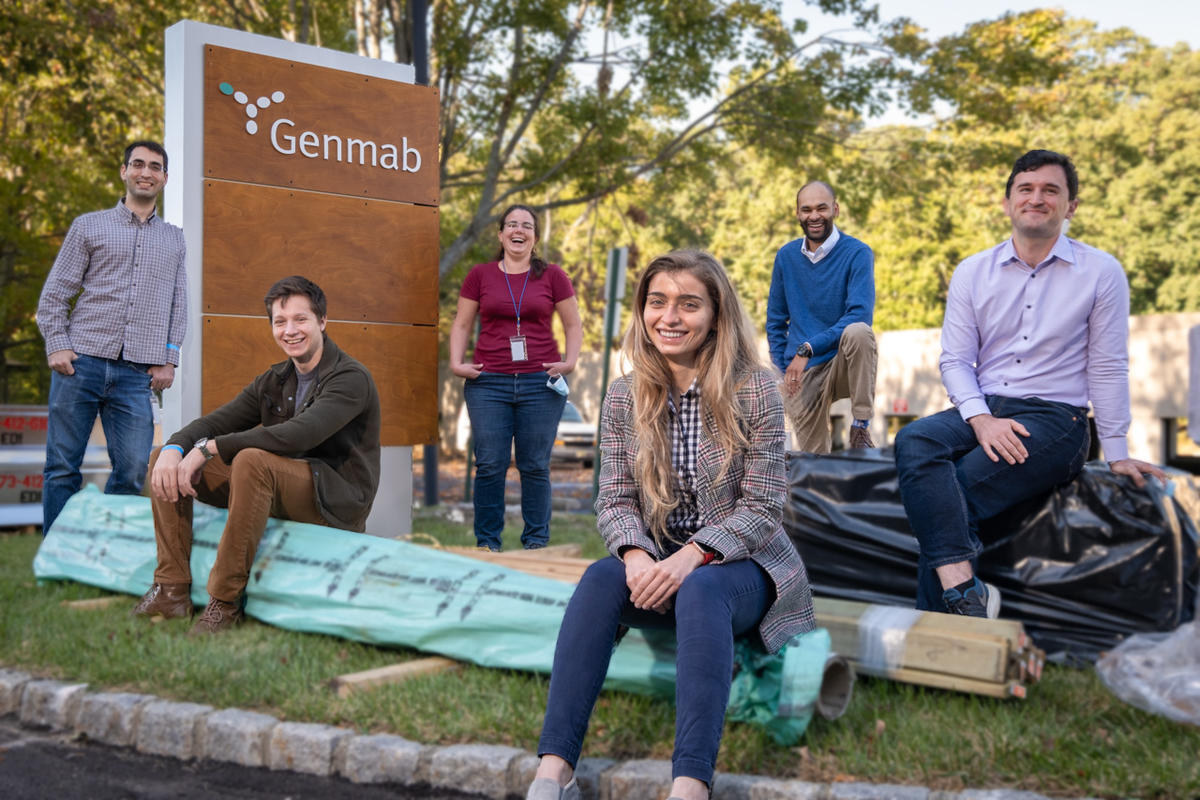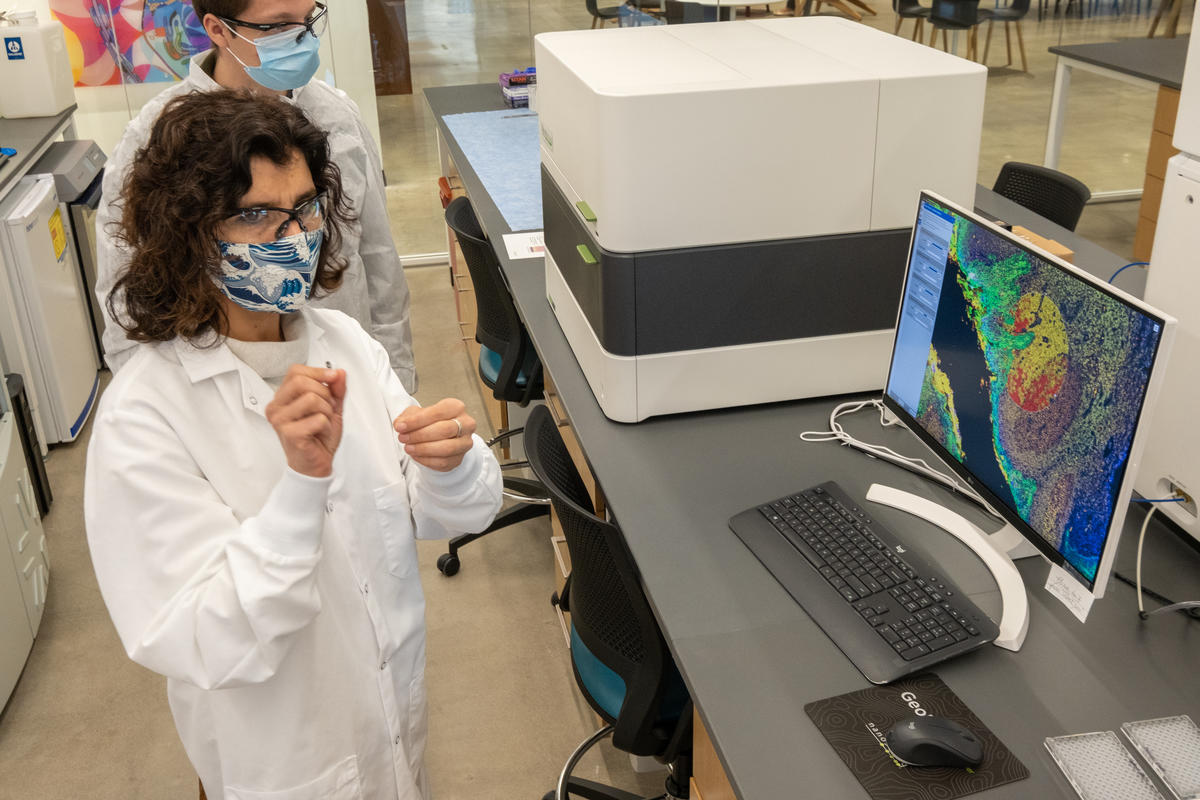PCI Signs Agreement with Genmab to forge Strong Community Bond
Opening a new chapter in community-based collaboration, the Princeton Catalysis Initiative (PCI) has signed a partnership agreement with Genmab, an international biotech company based in Denmark with U.S. headquarters in Plainsboro. This is the sixth partnership for PCI in just over two years.
PCI enables new synergies and mission-inspired projects between Princeton University researchers and corporate scientists. The Genmab partnership was officially launched this month during a socially distanced tour of Genmab’s state-of-the-art facilities.
Genmab has had a modest presence in New Jersey for 20 years now. But the company recently enlarged and renovated its facilities and is actively recruiting to expand its team, signaling an ambition to engage the region’s innovation ecosystem that has the University at its core. Collaborations will flow from Genmab’s proximity to campus researchers, with an emphasis on involving postdocs and graduate students.

Photo by C. Todd Reichart
Inaugural PCI-Genmab projects target new technology from the Department of Chemistry’s MacMillan lab and the Department of Molecular Biology’s Adamson lab. A third project is being finalized.
Launched in early 2018, PCI has inked partnerships with Bristol-Myers Squibb, Celgene, Merck, Janssen, and Genentech.
Genmab specializes in the creation and development of differentiated antibody therapeutics for the treatment of cancer. It joins the PCI fold with plans to create a “different type” of partnership.
“Close collaboration with top-tier research institutions is part of our Genmab DNA,” said Genmab’s Corporate Vice President for Translational Research Kate Sasser. Sasser noted that their global R&D center in Utrecht, the Netherlands, has an open-door policy with academics in that region. The company plans to cultivate similar “back-and-forth” connections here through a multi-year approach that could eventually incorporate a seminar series for students and an internship program.
“Since our inception in Denmark and the Netherlands, we have built extensive ties within the larger life-sciences ecosystem, such as medical centers and universities and academia,” said Sasser. “Now that our Princeton-Genmab site is expanding as an end-to-end biotech, we believe Princeton can be an amazing partner. Princeton is known for solving big human problems with brilliant minds in areas that matter to Genmab, including biomedical, biological sciences, and computational biology.
“Our vision,” Sasser added, “is to partner with PCI on research projects in specific areas that unlock novel approaches in cancer research, antibody science, and data science.”
Advancing our Knowledge of Cancer Biology
The PCI-Genmab partnership has already spurred two projects that will help uncover novel insights into cancer biology and the functioning of the human immune system.

Photo by C. Todd Reichart
One project, with Britt Adamson, assistant professor of molecular biology, uses single-cell, CRISPR-based technologies in patient samples to identify genes associated with response and resistance to antibody therapies. The second project, with David MacMillan, the James S. McDonnell Distinguished University Professor of Chemistry, seeks to understand the location of specific antigen targets of interest within tumor cells and how these targets interact with other proteins within the cell membrane.
PCI, and its utility in connecting emerging science with industry partners that can scale it, is one of Princeton’s key innovation drivers.
“The Princeton Catalysis Initiative is unique among academic institutions in that it fosters both internal collaborations among faculty and external research collaborations with industry,” said Rodney Priestley, Princeton’s vice dean for innovation. “In just a short time, the initiative has inspired groundbreaking research. It is exciting to see how these external partnerships, including the new one with Genmab, help drive innovation at Princeton to have a positive impact on society.”
Jacob Geri, a postdoctoral fellow with the MacMillan lab, is ensconced in the Genmab project, which involves a new way of using the lab’s proximity labeling technology µMap, unveiled last spring. µMap allows scientists to identify, through the use of a photocatalyst, the proteins on a cell’s surface that are contiguous to each other. It is analogous to mapping a suburban neighborhood to see who lives next-door to whom in order to diagram the relationships.
But under the PCI-Genmab project, researchers will pivot slightly – mapping not cells in a petri dish, but cells from human tissue removed during biopsies, reflecting the human condition more closely to the disease of interest.
“I’ve been so into this problem since we first discussed it,” said Geri. “This problem is intriguing because the tissue resource is just astounding. Instead of using this technology on cancer cells that are in petri dishes from animal models, we’re going to use it on human cells that have been preserved from literally millions of patient biopsies. We can investigate the differences in protein-protein interactions between specific proteins and whatever they’re interacting with in a highly specific way.”
Genmab is based in Copenhagen, Denmark. Founded 1999, it currently has 800 employees across four international locations, including Copenhagen;
Utrecht, the Netherlands; Plainsboro, New Jersey; and Tokyo, Japan.
